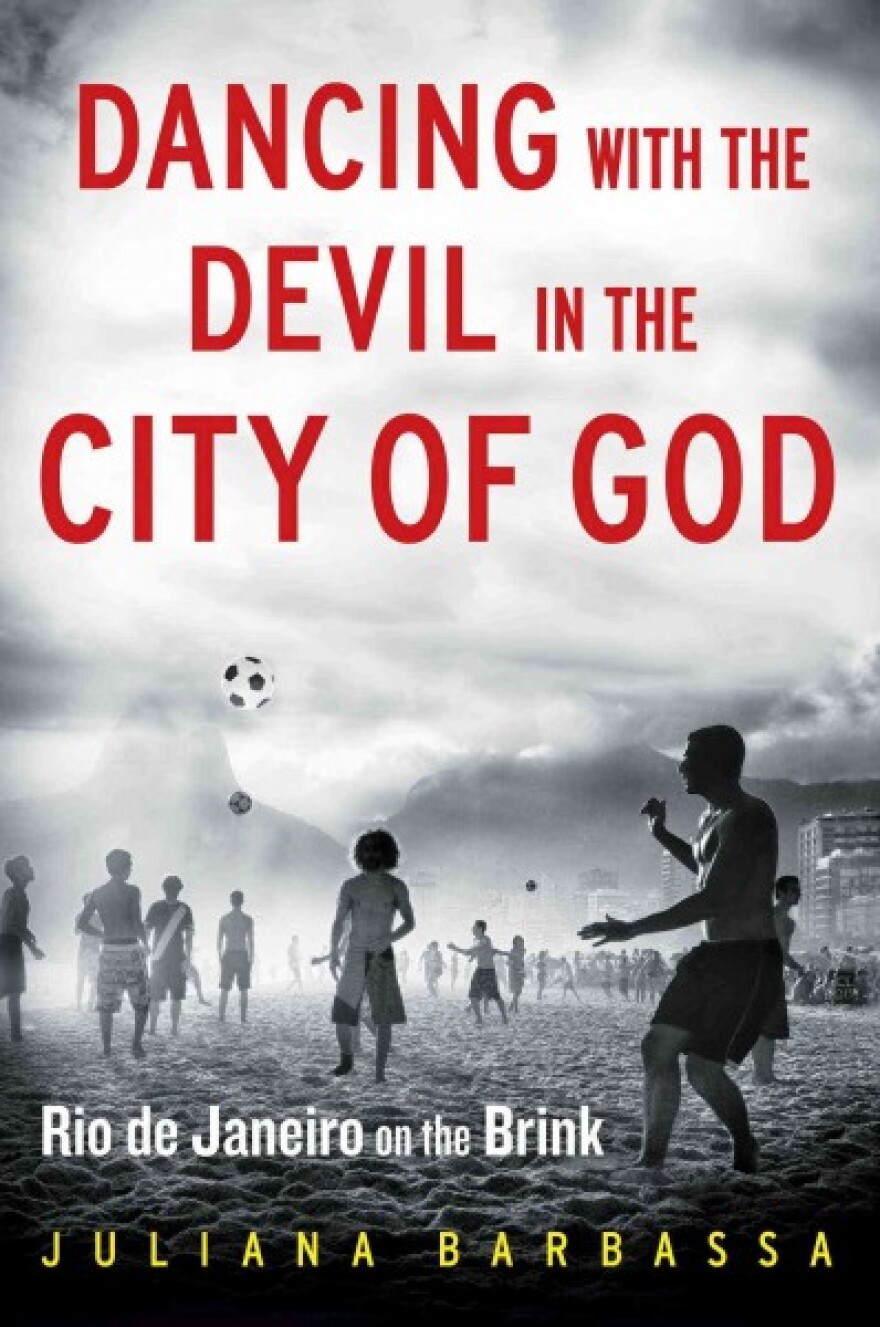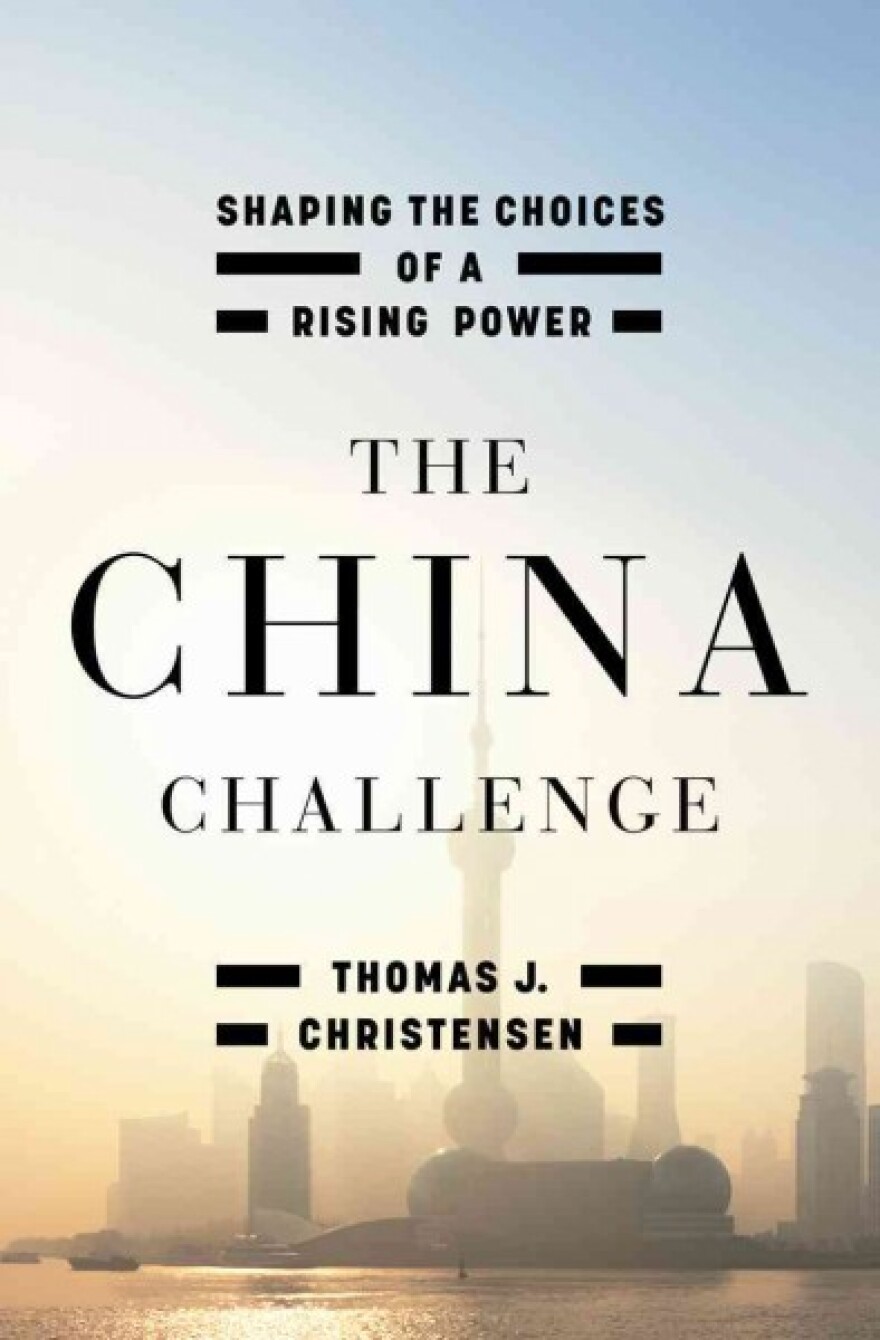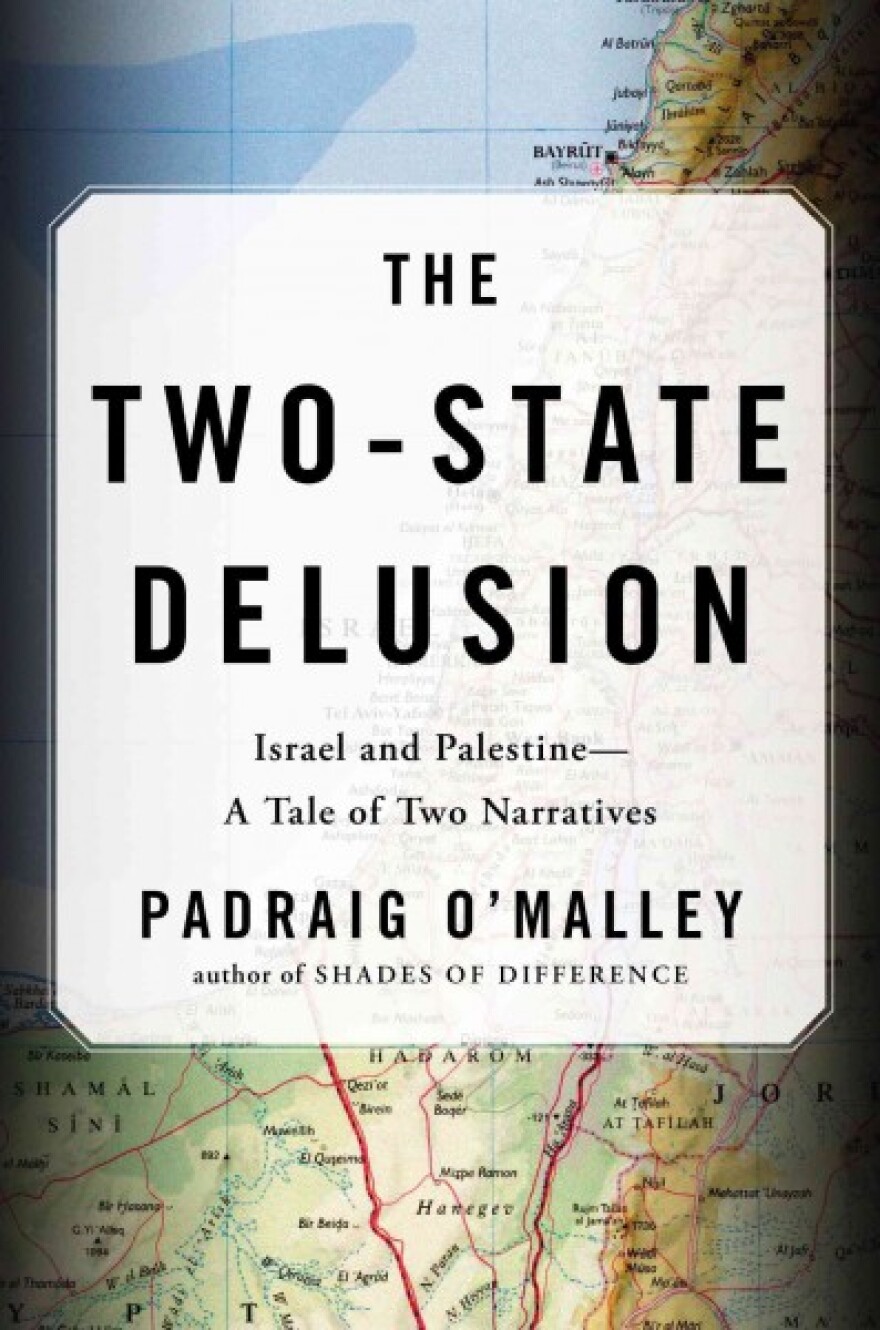From ancient China to its modern rise, from the searing feuds of the Middle East to the cultural contradictions of Rio, our international staff offers up some of the best books of 2015.
Copyright 2024 NPR. To see more, visit https://www.npr.org.
From NPR's International Staff: A Few Of Our Favorite Books
Dancing With The Devil In The City Of God

by Juliana Barbassa
Reviewed by Lourdes Garcia-Navarro, Rio de Janeiro correspondent
Rio de Janeiro is a deceptive city. It wears its beauty as openly as its wounds, so to a casual observer it feels knowable. The inequality here isn't hidden away like in so many other places: Lush green mountains tumbling down to the sun-smashed sea frame rich and poor alike; the favelas on the tops of the hills stand as proudly as the fancy high-rises that the ring the beaches. The fading dilapidated remnants of its history as the former capital of Brazil rub up against the modern infrastructure of the country's oil wealth.
In Julia Barbassa's fascinating new book, easy assumptions are peeled back to expose a place struggling to define its present and its future. Barbassa grew up the child of a Brazilian oil executive, living all over the world. In 2010, she returned to cover Rio de Janeiro as it transformed itself in anticipation of hosting the 2016 Olympic Games. So as a guide, she is both a knowledgeable insider and a fiercely critical outsider.
Barbassa introduces us to drug lords and prostitutes, environmentalists and businessmen all playing a role in a city that is in constant motion, hurtling toward a future that feels uncertain. Her attention to detail and the small moments that tell a broader story are what make this such a satisfying read. The book opens with her first tumultuous days on the job, covering the incursion of the police into gang-controlled favelas for the first time. We feel her shock when she realizes no provisions have been made to protect children, as the tanks roll into a place crowded with families cowering at home. She explores the contradictions between a city proud of its natural beauty and yet indifferent to its destruction: Most of Rio's beaches are not fit for swimming owing to pollution. Her conclusion is succinct: "Rio, beautiful and rotten." The book ends with the recent World Cup, the wasteful legacy of which Brazilians are still paying for.
As the title of the book implies, Brazil is indeed on the brink, on a precipice ready to soar or fall, or perhaps, as Barbassa suggests, fated to remain forever poised, waiting for liftoff.
The China Challenge

by Thomas J. Christensen
Reviewed by Anthony Kuhn, Beijing correspondent
Since President Xi Jinping came to power three years ago, there have been plenty of calls for a rethink of U.S. policy toward China. China's coercive moves in territorial disputes with its Asian neighbors, alleged hacks into U.S. government offices and corporations, and domestic crackdowns against civil society have led to gnawing doubts that the U.S. has miscalculated and that engagement with China has failed to prevent the rise of an illiberal regime that avoids shouldering its share of responsibilities on global issues, or bends international rules and institutions in ways that favor authoritarian regimes.
This makes The China Challenge, by Princeton China scholar and former diplomat Thomas J. Christensen, a very timely read.
It's impossible to know what kind of power China will be when it fully modernizes. U.S. policy toward it is therefore two-track. The U.S. engages with China on issues of global governance. But the U.S. also hedges against the possible emergence of a hostile China by beefing up its military alliances in Asia. China sees this "stick" as containment, leaving it with little appetite for the "carrot" of helping the U.S. with its global priorities, from nonproliferation to humanitarian interventions, especially as Beijing faces a host of thorny challenges at home.
Christensen is a cautious optimist who believes that conflict between the U.S. and China is neither inevitable nor likely, but possible. The first half of the book lays out reasons why China has every reason to support the international order from which it has benefited, and why China is not going to become a peer competitor of the U.S.'s anytime soon. The second half is a narrative of America's progress and setbacks in shaping China's choices from 1991 to 2014. He argues that the Obama administration's "pivot to Asia" was innovative but suffered from flawed "rhetorical packaging" that confirmed Chinese fears of containment.
The Two-State Delusion

by Padraig O'Malley
Reviewed by Emily Harris, Jerusalem correspondent
Addiction is a major theme in The Two-State Delusion, which takes a hard look at the rut of the Israeli-Palestinian conflict.
"If peace is actually the goal," writes author Padraig O'Malley, a University of Massachusetts, Boston professor with experience in other once-intractable conflicts, "neither the Palestinians' addiction to the comforts of humiliation and resentment nor the Israelis' addiction to the comforts of fear and security has worked very well."
This is not the way most protagonists in this conflict would describe themselves. But O'Malley's conclusion grew out of each sides' own ingrained narrative about the causes of the conflict and obstacles to its resolution.
His research drew me in because it rang true to much of my experience. Conversations with leaders on both sides frequently return to the same historic highlights, sometimes even the same turns of phrase.
Even when a person thinks outside the box, he or she can be reluctant to talk outside it, seemingly fearful this could crack open the door to alternative beliefs that might include the other's point of view.
So if negotiated settlement that results in two states is delusional, what next?
The Obama administration continues to support the two-state policy as the only option, using fear over financial leverage; dangling in front of Israel the specter that changing demographics could lead to a choice being a democracy or a Jewish majority state. There are other options floating around. A group of former Israeli security officials has drawn up a plan for a nonnegotiated Israeli pullout from the West Bank. Rising right-wingers in Israel argue for annexation, perhaps including Palestinians as citizens of Israel, perhaps not. On the Palestinian side, one shared state with equal rights for all is gaining visibility. Yet these ideas remain centered on the needs and narrative of the side putting them forward.
As O'Malley notes, the view held by each side is steeped in blood, shaped by time and experience. But he argues that with hate "calcifying" on both sides, it's time to quit "fiddling with variations of recommendations proposed some eighty years ago."
"Nothing is etched in infinity," he writes. And "overcoming addiction also involves a loss."
Black Flags

by Joby Warrick
Reviewed by Hannah Bloch, International Desk editor
In a year marked by ISIS-led and ISIS-inspired terrorist attacks in Europe and the United States, it's no longer possible to see the Islamic State as a threat limited to the Muslim world or the Middle East. For anyone seeking to understand the roots of this jihadist movement and how it has succeeded, there's no better place to start than Joby Warrick's Black Flags: The Rise of ISIS.
This is a vigorous, insightful and deeply reported look at the forces and individuals that helped create and shape a monstrous movement, and how ISIS found fertile ground to flourish in Iraq and Syria.
Warrick delves most vividly into the life of Abu Musab al-Zarqawi, whose brutal jihad a decade ago inspired what would eventually become ISIS. He traces the Jordanian's rise from mama's boy and heavy-drinking street thug to Islamist "sheikh of the slaughterers." Zarqawi was catapulted onto the world stage as the Bush administration prepared to invade Iraq in 2003. When America made its case to the United Nations Security Council, the obscure Jordanian's presence in a lawless part of northern Iraq was offered, wrongly, as evidence of Iraq's link to al-Qaida.
"In deciding to use the unsung Zarqawi as an excuse for launching a new front in the war on terrorism," Warrick writes, "the White House had managed to launch the career of one of the century's great terrorists."
The world came to know him better in 2004 when he appeared in a sickening video sawing off the head of U.S. hostage Nicholas Berg. Zarqawi presented himself as a black-clad jihadist ninja, Warrick writes, "killing an American with his own hands." This was a notable contrast to the world's most feared terrorist until then, the gray-bearded Osama bin Laden, "delivering ponderous sermons from behind a desk." It's not hard to guess which figure proved more charismatic to new jihadist recruits.
Warrick describes how Zarqawi engaged in an ambivalent dance with al-Qaida, both wanting its acceptance but resenting the unsolicited advice he received from its elders, who rebuked him for his ultraviolent tactics.
After Zarqawi's death in 2006 and a period of relative quiescence by his followers, they regrouped and returned with a vengeance, re-emerging in Syria in 2013 "not as a terrorist group," Warrick writes, "but as an army."
That army and its supporters and sympathizers are who the world confronts today.
Confucius

by Michael Schuman
Reviewed by Nishant Dahiya, International Desk editor
What are the philosophical underpinnings behind China's incredible rise? Are there any besides the desire for wealth and power? Michael Schuman, a China-based author and journalist, says yes and points toward a philosopher who lived some 3,000 years ago, Confucius.
Schuman argues that Confucius' teachings remain relevant across much of East Asia. "You can't conduct business, negotiate with a government official, make sense of issues that arise when dating, or comprehend what motivates East Asians today without an appreciation of Confucius," writes Schuman. Confucian values like family piety, respect toward elders, hard work and thrift are widely embraced across much of the region.
But these very same values were widely blamed for China's inability to modernize and fall behind as the West developed capitalism. Values and ideas blamed for their rigidity that shackle and slow societies, suppress women, stifle innovation and encourage despotism.
Over the past few decades though, Confucius has had a revival. After the Cultural Revolution, as China discarded Marxism and opened up to the West, it searched for a philosophy to underpin its rapid change in course. "The Chinese government lost the ideological justification for its existence." It found it, like emperors over the past few millennia, writes Schuman, "in Confucius. The same sage who had been blamed for everything wrong with China became, miraculously, the guide to lead China into a glorious future." This rise and fall of Conficius' teachings — and his appropriation by various Chinese rulers — makes for fascinating reading.
The book has an interesting structure that looks at Confucius from various angles — as a man, a sage, a chauvinist, a businessman — that allows Schuman to track Confucius' life, teachings and relevance over time. Schuman sprinkles easily digestible anecdotes throughout the book including original reporting and observations of his own.

